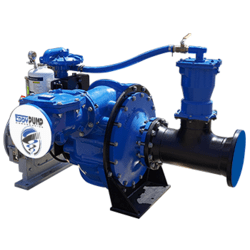Applications of EDDY Pump in Copper Refineries



Applications of Our Slurry Pumps in Copper Refineries

- Ore Transport: Mining slurry pumps are used to transport crushed copper ore as a slurry from mining sites to the refinery. The pumps efficiently move the ore-water mixture for processing.
- Grinding and Leaching: Copper ore is often ground into finer particles for leaching. Submersible pumps assist in conveying the ore slurry through grinding mills and leaching tanks, ensuring proper mixing and contact with leaching agents.
- Solid-Liquid Separation: The resulting slurry contains dissolved copper and other components after leaching. Submersible slurry pumps help transport the slurry to solid-liquid separation processes such as filtration or centrifugation, which separate the valuable copper-rich solution from solids.
- Tailings Handling: Copper refining generates tailings – waste materials that require proper management. Submersible pumps transport tailings to designated storage areas, minimizing the environmental impact of the refining process.
- Electrowinning and Electrorefining: Electrowinning or electrorefining extracts pure copper from the solution in later refining stages. Submersible pumps transport solutions between different process stages, facilitating efficient electrolysis or electroplating reactions.
- Materials Handling: The copper refinery handles various abrasive and corrosive materials. Submersible slurry pumps aid in effectively transporting these materials, ensuring they are moved without causing excessive wear on equipment.
- Environmental Compliance: Effective submersible pump systems contribute to proper waste management, reducing the ecological footprint of refining operations and ensuring compliance with regulations.
- Energy Efficiency: Optimized submersible pumps enhance energy efficiency by minimizing friction losses and improving pump performance, a critical consideration in energy-intensive refining processes.
- Maintenance and Reliability: Durable industrial slurry pumps for minimal maintenance disruptions contribute to continuous refining operations and reduced downtime.
CALL FOR SALES OR SUPPORT
If you need help with Pump Selection, Sales or Engineering Support
Call 619-345-5446

Application of EDDY Pump’s Hydraulic Dredging in Copper Refineries

- Tailings Pond Management: A copper refinery often has tailings ponds where waste materials accumulate. Hydraulic dredging can be used to remove sediment and maintain the capacity of these ponds, preventing environmental issues and ensuring adequate waste management.
- Sludge Removal: Sediment and sludge can accumulate in various refining equipment. Hydraulic dredger assists in removing these materials from settling tanks and other components, maintaining efficient refinery operations.
- Water Recycling and Treatment: Water is a vital resource in refining processes. Dredging helps manage water quality by removing sediments, facilitating water recycling, and improving the efficiency of water treatment systems.
- Environmental Remediation: Copper refining can lead to sediment accumulation with trace metals. Hydraulic dredging aids in cleaning up contaminated sediments, contributing to ecological remediation efforts.
- Infrastructure Maintenance: The dredge pump system helps maintain waterways, intake systems, and other infrastructure used in the refining process. Keeping these pathways clear ensures consistent water flow for cooling and processing.
- Effluent Treatment: Hydraulic dredgers can be integrated into treating effluent or wastewater streams. Removing solids using dredging aids in meeting regulatory requirements and minimizing environmental impact.
- Safety and Accessibility: Regular maintenance dredging enhances safety by preventing sediment accumulation, which can pose hazards or restrict navigation and access.
- Resource Recovery: Some refining processes involve recovering valuable materials from sediment or sludge. Submersible hydraulic dredge supports the extraction of these materials for further processing and reuse.
- Site Restoration: Over time, water bodies within a refinery site may become polluted. Hydraulic dredging can be part of site restoration efforts, enhancing water quality and the environment.
- Emergency Preparedness: In case of spills or accidents, submersible hydraulic dredge can aid in rapid cleanup by removing contaminated sediments from water bodies.




